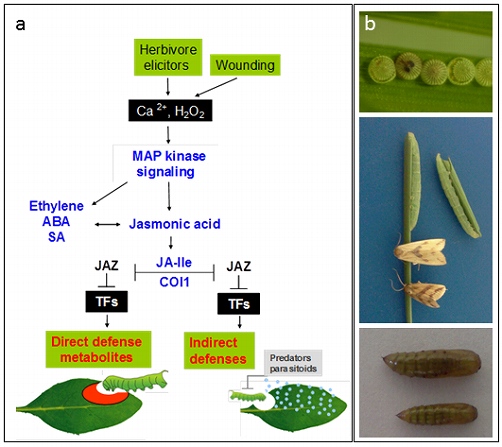Research Activities
Our Laboratory is a newly established lab under IPSR Biotic Stress Unit (~since April 2011). New graduate students (Master, PhD degree) are always welcomed to join the group, which is focused on molecular mechanisms involved in the interactions between monocot plants and herbivorous insects. The research projects in the laboratory are assigned to three main areas:
1 Perception of herbivore signals
Because of a large diversity of insect species, herbivores can produce a wide range of elicitor types, most of which remain unknown. We use plant bioassays and biochemical tools to identify the active elicitors from herbivores that associate with monocot plants.
2 Signal transduction mechanisms
After perception of specific herbivore-associated signals, most plants elicit strong oxylipin burst that activates downstream responses exemplified by large transcriptional and post-transcriptional changes in the plant cells. We investigate the spatial and temporal dynamics of accumulation of plant stress hormones (jasmonic acid, salicylic acid, abscisic acid and ethylene) and study their role in regulation of defense genes.
3 Metabolic changes during herbivory
Herbivore attack leads to the profound changes in plant metabolism. Metabolic genes activated by hormone signaling produce large amount of secondary metabolites that function as defense shield against herbivores. We use metabolomics approach to perform broadly targeted search for novel defense metabolites using herbivore attacked monocot plants.

(a) Herbivore attack induces burst of jasmonic acid which is converted to jasmonoyl-isoleucine (JA-Ile) that mediates COI1-dependent degradation of JAZ repressor proteins, transcriptional reprogramming and activation of defense responses against insect herbivores in plants. (b) Developmental stages of rice green semilooper ( Naranga aenescensMoore) (lepidoptera: Noctuidae)
